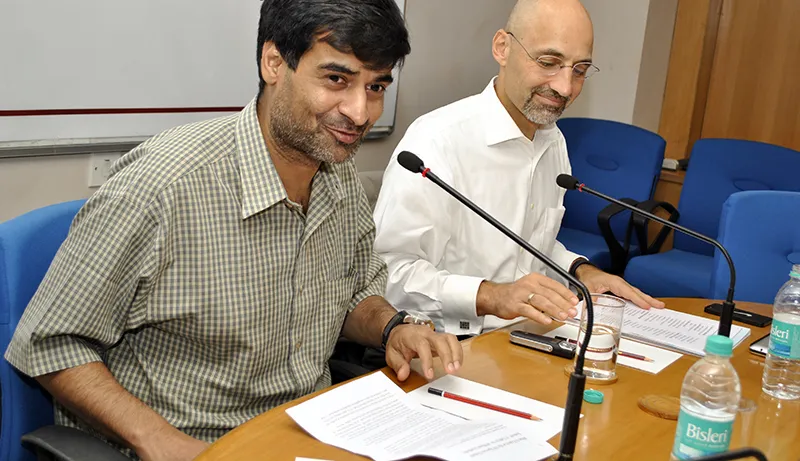-
CENTRES
Progammes & Centres
Location
As India, China, US and the European Union grapple with the need for equitable and meaningful climate action, strategies are also needed to address the differing needs and capabilities of the sub-national entities that make up these big players.

The global response to climate change planned to be negotiated at the Conference of the Parties in 2015 will partly hinge on the application of centre-state federalism to the climate change challenge. As India, the European Union, the United States, and China grapple with the need for equitable and meaningful climate action, strategies are needed to address the differing needs and capabilities of the sub-national entities that make up these big players.
This nuance, that climate change negotiations will be an issue not just between states but within them, was discussed at a discussion organised on September 8 by Observer Research Foundation to understand the varying perspectives underlying India’s and other nations’ positions in the upcoming United Nations climate negotiations.
The event , moderated by Samir Saran, Vice President of ORF, featured Dr. William Antholis of the Brookings Institution. Dr. Antholis recently completed Inside Out, India and China, a book examining the importance of China’s provinces and India’s states.
Saran opened the event with a discussion of the crossroads in India’s energy and foreign policy represented by Prime Minister Modi’s recent election. Modi has proved willing to act decisively, but his decision-making process and priorities are yet to be determined.
Dr. Antholis followed with a review of the challenges India faces from climate change, including rising sea levels and a declining monsoon. He discussed a potential per capita-based distribution of the world’s ’climate budget’ for 2050, allocating 4 gigatons of carbon dioxide emissions for India’s growing economy. Such an approach is cognizant of the United Nations principle of ’collective but differentiated responsibility’ (CBDR), acknowledging the different role developed and developing countries should equitably play in preventing climate change.
However, Dr. Antholis’s research goes further, determining how large countries can create versions of common but differentiated responsibility within their own borders. Taking the examples of China, the European Union, and the United States, he outlined how jurisdictional divisions within these entities can take differentiated action. The United States has developed a plan that targets wealthier states, and those reliant on non-indigenous coal, for large emissions reductions, while poorer states heavily reliant on coal will see little change. Similarly, China’s plan might involve emissions reductions in the advanced coastal provinces that account for the majority of China’s exports, while giving more leeway to less-developed inland provinces. In the European Union, the divisions would occur between member nations rather than provinces, with differentiated reductions between more developed western countries and eastern ones still in need of economic growth.
Dr. Antholis posited a similar division of responsibilities between differentially developed Indian states. Referencing his meeting with Narendra Modi on the success of Gujarat, he discussed the connection between electrification, bureaucratic reform, the spread of renewable energy, and the need for continued coal power use in developing states.
Discussants voiced concern at government support for renewable energy, arguing that would limit innovation in the renewable sector in a self-defeating manner. Others raised the issue that Gujarat’s much-lauded development came with higher electricity prices, and that human development challenges still remain.
Discussion continued about the feasibility of action against climate change in federal and democratic societies. Although India, unlike other countries, would perhaps not need any difficult legislative ratification of a binding treaty that its government had signed, it would face a different problem—the potential for states, the ultimate arbiters of implementing any treaty, to fail or refuse to do so. Thus, federalism must not only be top-down, but also bottom-up in its approach.
Intriguingly, climate change regulation has happened in relatively non-democratic ways even in democratic systems. In the United States, carbon regulation has been pushed largely by the executive with the backing of the courts; in Europe, a few countries have made it important for the union in the political economy of the EU.
Nonetheless, there is reason to be more optimistic about the capability of democratic than non-democratic states to combat climate change. In keeping with Winston Churchill’s dictum that "democracy is the worst form of government except for all the others," once environmental action is agreed on in democratic countries, it tends to happen as a result of the check public opinion and transparency exercises on their leaders. In contrast, China’s environmental reforms have been slow to take hold despite the low air quality in many cities because Chinese bureaucrats are still incentivized by GDP growth rates rather than public pressure.
Some believe Modi can lead India on a growth trajectory that is sustainable from the start, rather than following the China model of environmentally unfriendly growth that must later be adjusted to account for human health and wellbeing. Yet it was pointed out that the tendency to hyphenate India and China together as emerging nations does a disservice to India’s lower emissions than the ’big three’ of US, EU, and China.
The issue of equity featured highly in the discussion, with discussants noting that earlier carbon peak dates necessitate more sacrifice from developing rather than developed countries. This will make it hard for India to agree to a peak date.
Saran and Dr. Antholis concluded with a discussion about the conditions necessary for US support of the climate treaty. These included not requiring official ratification, voluntary agreements by developing countries, and a clean development mechanism that allows for private capital flows.
(This report was prepared by Will Poff-Webster, Henry Luce Fellow at Observer Research Foundation, Delhi)
The views expressed above belong to the author(s). ORF research and analyses now available on Telegram! Click here to access our curated content — blogs, longforms and interviews.